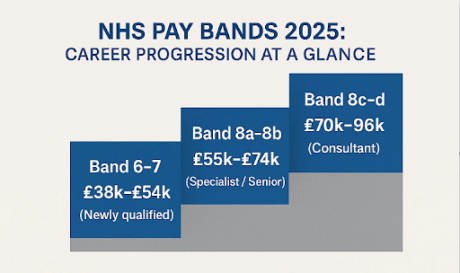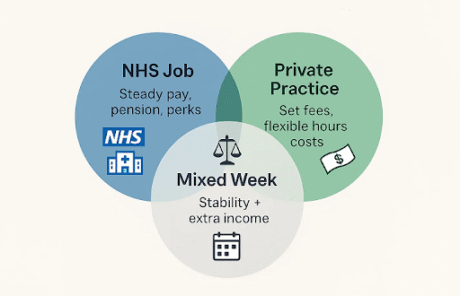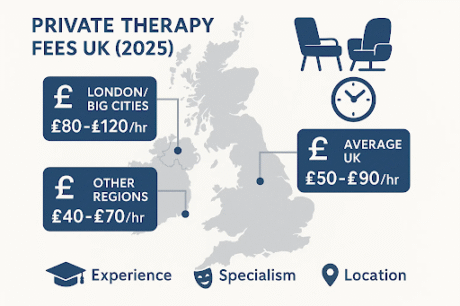No products in the basket.
Wondering how much does a therapist make? The answer depends on where you work, your experience, and the type of work you take on. In the NHS, pay usually ranges between £31k and £63k, depending on your level. Private sessions can bring in much more—anywhere from £50 to £120 an hour, especially in London. Ultimately, the number on paper isn’t always what hits your bank account. Your take-home pay depends on your hours, location, and monthly costs. Knowing the real picture helps you plan smarter and avoid surprises.
How Much Does a Therapist Make in the UK in 2025?
If you’re thinking about becoming a therapist, or you’re already on the path, pay is an important question. Let’s break it down clearly.
Starting Out
When you’re new to the role, salaries usually begin around £23,000 a year. It may feel modest, but it provides a reliable starting point for progression.
With Experience
As you gain confidence and skills, most therapists move into the £30,000 a year range. Many reach £40,000 or more once they take on extra responsibilities.
Working in London
Therapists in London generally earn a bit more, with average pay around £33,000. In some cases, salaries can climb above £50,000, reflecting the higher cost of living in the city.
NHS Pay Bands

In the NHS, pay is structured by bands, which makes career progression clear:
- Band 6–7: £38,000 – £54,000
- Band 8a–8b (specialist/senior): £55,000 – £74,000
- Band 8c–8d (consultant): £70,000 – £96,000
This system means your earnings will grow steadily as you move up the ladder.
What Affects Pay
Several factors influence how much a therapist takes home:
- Location (London and big cities often pay more)
- Employer type (NHS, private practice, or charity)
- Specialism (e.g. psychotherapy, counselling, clinical psychology)
- Extra work (such as private clients or additional duties)
Therapy is one of those rare careers where your income and your impact grow side by side. You can expect a steady, reliable salary, with clear room to progress. And just as importantly, you’ll be building a career that changes lives as well as supporting your own.
Where Your Income Comes From
You’ve basically got three main paths: an NHS job, private practice, or a mix of both. Each path seems different, with its own ups and downs.

- NHS Job – Steady pay on the national NHS scale, plus perks like paid leave and a pension. It’s comforting to know your income is reliable.
- Private Practice – You have to set your own session fees and hours. It feels exciting, but you also manage all the costs.
- Mixed Week – Combine both. The NHS provides stability, and private work adds extra income and flexibility.
NHS Pay Ladder
The NHS pay ladder works in steps, called bands. Higher band = higher pay. When you’re just starting out, you’ll be in the lower to mid bands. It might feel a bit slow at first, but your pay grows as you gain experience. Once you reach senior or lead roles, your band jumps up, and so does your salary. If you’re in London, there’s an extra called the High-Cost Area Supplement to help with higher living costs.
London Top-Ups
If you work in or around London, you get a little extra on top of your usual salary. This is called London weighting, and it’s really helpful with the city’s high living and travel costs. The closer you are to the city centre, the more extra pay you get. Being right in the heart of London means that a top-up can really help with those extra bills and make things feel a little lighter.
Private Therapy Fees

Private therapy in the UK usually costs £50–£120 per hour, with London and big cities at the higher end. Outside of London, prices can be lower, often around £40–£70.
Costs vary depending on the therapist’s experience and specialism — a newly qualified counsellor may charge less, while an experienced CBT or trauma therapist may charge more. Remember, fees also cover things like room hire, insurance, and ongoing training.
The big benefit? You often get shorter waiting times, more choice, and the flexibility to find someone who truly fits your needs. For many people, that peace of mind makes the investment worthwhile.
What Lifts Your Earnings
- Extra training – Skills like trauma, couples therapy, or CBT increase pay and confidence.
- Smart diary planning – Popular slots with limits prevent burnout.
- Partnerships – Insurers, EAPs, or clinics give steady referrals.
- Mix of work – Combining NHS and private work gives both stability and freedom.
Expenses That Shrink Your Take-Home
It’s easy to forget all the little extras that eat into your pay—things like room hire, supervision, insurance, CPD, software, and marketing. Honestly, these costs can add up quickly, but if you plan ahead, you won’t get any nasty surprises. Your session fee might look great on paper, but that’s not the money you actually take home. Checking your costs every month helps you stay realistic and stress-free.

Early-Career Routes & Typical Milestones
If you’re just starting out, most people begin with an NHS therapy job. It’s a safe and steady way to build up experience and learn the ropes. As time goes on, you can move into specialist roles and, later, senior positions. With each step, the pay improves, and so does the level of responsibility. And honestly, there’s something really rewarding about seeing your career grow and knowing you’ve earned each milestone.
Once you’ve got supervision and understand the ethics, you can also start taking private sessions. It’s exciting to see your options open up and to have more control over your schedule and income. It gives you a sense of freedom while still keeping some security.
Benefits That Add Real Value
- NHS perks – Having a pension, paid leave, sick pay, and protected CPD time gives real peace of mind when you need it most.
- Team support & policies – Clear rules, helpful guidance, and good support make work feel easier and less stressful.
- Balance with private work – These perks make private work feel less risky and give you peace of mind, even if it pays more.
Ethical Rate-Setting Checklist
- Know your costs and capacity – Take a moment to look at your costs and how much work you can actually manage. You’ll feel more at ease when your schedule matches your energy levels.
- Check local rates and your niche – See what others are charging. This helps you stay fair but also makes sure you don’t undersell yourself.
- Write clear cancellation and rescheduling rules – It’s a relief when everyone knows what to expect, and you don’t get caught off guard.
- Review prices annually – Let clients know in advance about any changes. It keeps things simple and makes your work feel much calmer.
A Sustainable Schedule for Therapists
- Anchor with NHS or charity hours – Begin with steady hours that give you stability. Having a reliable base each week makes everything feel more secure.
- Add private slots on fixed days – Keep it limited so you earn extra without getting stressed. It’s exciting to have some freedom, but still know your week won’t get chaotic.
- Protect rest and supervision time – Take breaks and supervision to stay clear-headed and avoid burnout.
Money Safety Habits for Therapists
A really smart habit is keeping three months ‘ worth of costs aside. It feels so much better knowing you’ve got a little safety net if things slow down. Don’t put all your eggs in one basket—get clients from different places like GPs, directories, insurers, or EAPs. It’s such a relief to know work keeps coming in without you chasing it all the time. Always use written agreements and clear rules with clinics and clients. It stops confusion and keeps your work running smoothly, which makes life a lot less stressful.
City & Region Snapshot
- London / South East – Higher fees plus NHS top-ups. Perfect if you want to cover those pricey city bills.
- Big cities – Mid-to-high fees with strong demand. Plenty of clients, but things move fast!
- Smaller towns / rural areas – Lower fees, but less stress and fewer competitors. Life’s calmer and simpler here.
Growth & Upskilling Opportunities
If you want to make more money and feel confident, the best thing you can do is keep learning. Take extra workshops or courses in things like trauma, couples therapy, or CBT. It’s exciting to gain new skills, and it can help you get higher-paying roles.
Getting accredited in a special area or taking on a supervisory role also helps—you get more respect and earn more. Even little steps, like joining a professional group or doing short courses, can open doors. Plus, clients trust therapists who are always learning, which can mean more sessions and better take-home pay.
FAQs
- How much do therapists get paid in the UK?
It all depends on your experience and where you work—usually £31k–£63k in the NHS, and £50–£120+ for private sessions.
- Which type of therapist makes the most money?
Therapists with specialist skills, like CBT, trauma, or couples work, usually make the most money.
- How much does a therapist make in the NHS?
NHS pay ranges from about £31k for entry-level to £63k for senior roles, plus possible London top-ups.
- What GCSEs do you need to be a therapist?
Most need good passes in English, Maths, and sometimes Science. Specific courses depend on your degree path.
- Is £35k a good salary in the UK?
For beginners, yes! It usually pays the bills, though London can stretch your budget.
- Does a therapist get a lot of money?
It varies. Private work can boost earnings, but NHS roles offer security and perks instead of huge pay.
Final Thoughts
So, how much does a therapist make really depends on your path, experience, and where you work. NHS roles give steady pay and great perks, while private sessions can boost your income and give more flexibility. Mixing both can be the sweet spot—steady security plus extra earning potential.
Remember, it’s not just about the money. Planning your week, tracking costs, and setting clear rules keep your work calm, balanced, and sustainable. A little effort up front makes a big difference to your take-home pay and peace of mind.
If you’re ready to take the next step in your therapy career, check out the Introduction to Psychotherapy Training at Course Cave today. It’s a great way to get started and see what works best for you!




